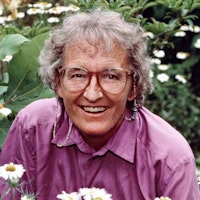The ultimate lesson all of us have to learn is unconditional love, which includes not only others but ourselves as well.
Elisabeth Kübler-Ross

Unconditional Love
Topic: Love, Compassion, & Kindness
The ultimate lesson all of us have to learn is unconditional love, which includes not only others but ourselves as well.
Elisabeth Kübler-Ross was born in Switzerland on July 8, 1926, and her life journey took her from the heart of Europe to the intricate corridors of the human psyche. A groundbreaking psychiatrist, she is best known for her pioneering work in Near-death studies and her seminal book "On Death and Dying," published in 1969. In this work, she courageously broached the subject of mortality, delineating what would later be known as the Kübler-Ross model or the Five Stages of Grief. These stages—denial, anger, bargaining, depression, and acceptance—were initially described as phases individuals go through when grappling with their own impending death. Over time, however, these stages have also been recognized as universally relevant to anyone dealing with loss or grief, expanding our understanding of the shared human experience of love and suffering.
More than an academic, Kübler-Ross was a tireless educator and humanitarian. She received twenty honorary degrees and estimated that she had educated around 125,000 students through her courses on death and dying across various institutions. Notably, she was also a 2007 inductee into the National Women's Hall of Fame. Her voice reached far beyond the medical and psychiatric communities; in 1970, she delivered the prestigious Ingersoll Lectures on Human Immortality at Harvard University, casting a spotlight on the theme of On Death and Dying. The breadth of her influence attests to the universality of her message, one that transcends academic disciplines and speaks to the heart of our collective human journey.
While she was often dubbed the "death and dying lady," she considered herself more aptly as the "life and living lady." The Elisabeth Kübler-Ross Foundation, inspired by her life's work, continues her mission. The foundation serves as a vivid reminder that her teachings were not solely about the end of life but about embracing the totality of existence—both its trials and its joys. It is this enduring focus on love, acceptance, and the interconnectedness of all life's experiences that makes her legacy a living testament to the transformative power of compassion.
Kübler-Ross, Elisabeth. "Death: The Final Stage of Growth," p. 76

Elisabeth Kübler-Ross
Theme: Love

About This Elisabeth Kübler-Ross Quote [Brief Commentary]
Elisabeth Kübler-Ross offers a direct and essential teaching: “The ultimate lesson all of us have to learn is unconditional love, which includes not only others but ourselves as well.” She does not present love as a concept to admire from a distance but as something each of us must learn through life itself. By naming it the “ultimate lesson,” she places it at the center of our growth, suggesting that everything else—success, loss, suffering—ultimately prepares us for this. The clarity of her language leaves little room for confusion: this kind of love must reach both outward and inward.
In including “not only others but ourselves,” Elisabeth Kübler-Ross corrects a common tendency to exclude the self from compassion. Many are taught to serve and forgive others but never taught to treat themselves with the same regard. Her words offer a necessary balance: the practice of unconditional love cannot be whole if it leaves out the one practicing it. Self-love, in this light, is not indulgent—it is integral. Without it, love becomes partial and unstable. Her sentence holds both aspects together in one movement.
Kübler-Ross also emphasizes that this lesson must be learned. Love, especially in its unconditional form, is not automatic. It develops through experience, through facing life as it is. The phrase “all of us have to learn” includes everyone—it is not reserved for a few. This learning is often shaped by difficulty, which softens judgment and opens the heart. In keeping both directions—toward others and ourselves—she describes a love that does not depend on worthiness or perfection. It is a love that remains.
The Ultimate Lesson—Elisabeth Kübler-Ross [Excerpted Commentary]
The sole purpose of life is to grow. The ultimate lesson is learning how to love and be loved unconditionally… I truly believe that my truth is a universal one—above all religions, economics, race and color—shared by the common experience of life. All people come from the same source and return to the same source. We must all learn to love and be loved unconditionally… [See Resources for the link to this Awakin.org article.]
Additional Kübler-Ross Quotes
Resources
Related Quotes
Copyright © 2017 – 2026 LuminaryQuotes.com About Us